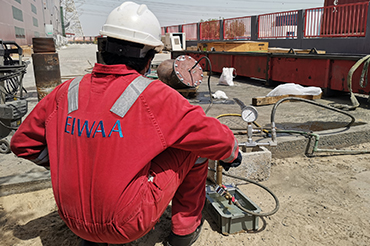PRESSURE TESTING IN SAUDI ARABIA
EIWAA Marine Services offers Pressure Testing Services of both Hydro testing as well as Pneumatic Testing Services for Cargo hoses and Pipelines. Hydro Testing Services covers the scope of Pipelines, vessels, elbows, control valves, actuators, oil suction hoses, firehoses, skids, pressure vessels, manifolds, air compressors etc. Our Oil and Gas Services Division provides Hydro Testing and Pressure Testing Services for pipeline and piping inspection and storage tank inspection with third party Certification across Saudi Arabia.

HYDRO TESTING IN SAUDI ARABIA
The term “hydro test” or “hydrostatic test” refers to a pressure test used to demonstrate the integrity of a pressure vessel using a liquid medium. Hydro testing services must use a test pressure that is 1.5 times the design pressure or that considers the design and test temperatures. The pressure ranges are monitored and indicated using two pressure gauges and chart recorders. The best place for hydro testing pressure gauges is at the top of the vessel with a separate nozzle from the hydrotest pump. According to the requirements of the ASME/API Code, EIWAA Marine Services always employs calibrated pressure gauges, chart recorders, and temperature/pressure test recorders.
PRESSURE VESSEL INSPECTION AND CERTIFICATION
Pressure Testing Services is important in Pressure Vessel Inspection and Certification. Hydro Testing shall be conducted as per the API 510/ASME SEC VIII regulation by authorized API 510 Inspection Engineers. EIWAA Oil and Gas Services always use calibrated pressure gauges and pressurizing kit to execute the pressure testing for Pressure Vessel. Hydro testing services must use a test pressure that is 1.5 times the design pressure or that considers the design and test temperatures. The pressure ranges are monitored and indicated using two pressure gauges and chart recorders. The best place for hydro testing pressure gauges is at the top of the vessel with a separate nozzle from the hydrotest pump. The Hydrotest’s safety inspections also look for things like barricade areas, suitable gaskets, nuts, and stud bolts. According to the requirements of the ASME/API Code, EIWAA Oil and Gas always employs calibrated pressure gauges, chart recorders, and temperature/pressure test recorders.
PIPING INSPECTION AND CERTIFICATION
EIWAA offers the following inspections and certifications using approved NDT Testing and Integrity assessment Inspections:
- Pressure and structural calculations are two engineering evaluations.
- Pipeline and piping fitness for service evaluations
- Inspections based on risk (RBI).
- Inspections motivated by damage mechanisms.
- Pipeline corrosion rate and remaining life assessment
- Piping hydro testing and certification
- Pipeline pressurization testing
- Pipeline ultrasonic thickness assessment
- Pipeline leak testing for both above ground and underground pipelines.
- Pipeline corrosion monitoring.
The fluid that is typically clean/fresh water or treated fluid is used in the flushing or hydrostatic testing operation. (Where applicable, a suitable corrosion inhibitor, chloride-controlled water, combination, or mixture of such are used to prevent damage due to water’s negative effect on the pressure vessel. A pneumatic test is a pressure test that uses dry compressed air, inert gas, water, or soap solution to demonstrate the integrity of the pressure vessel, nozzle, chamber, reinforcing pads, etc.
Pressure Vessel inspection in Detail:
In order to assure statutory inspections and remaining life assessments for safe use of pressure vessel, we are well equipped with following competencies,
Our Competencies:
- mechanical integrity
Engineering Assessment
- mechanical integrity
- Inspections of Thickness and Dimensional measurements
- Fit for Service Assessments (FFS)
- Corrosion Rate and Determination of Remaining Life.
Piping and Pipeline Inspection Services
EIWAA offers the following inspections and certifications using approved NDT tools and Integrity assessment Inspections:
• Certification and Inspection of Above-Ground Pipelines
• Certification and Testing for Underground Pipelines
Our Competencies:
-
- Pressure and structural calculations.
- Pipeline and piping fitness for service evaluations
- Inspections based on risk (RBI).
- Pipeline corrosion rate and remaining life assessment
- Piping hydro testing and certification
- Pipeline ultrasonic thickness assessment
- Pipeline leak testing for both above-ground and underground pipelines.
- Pipeline corrosion monitoring services.
